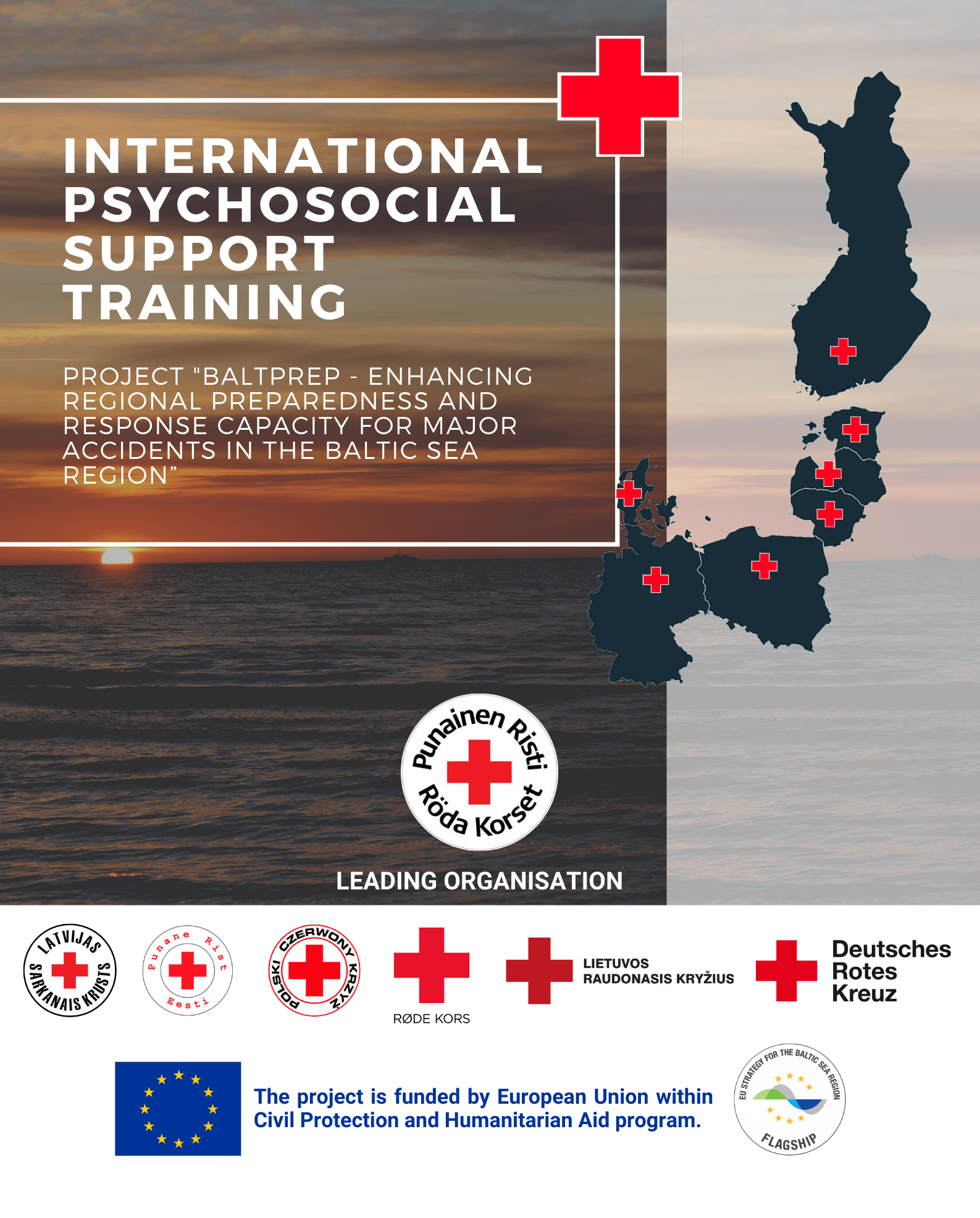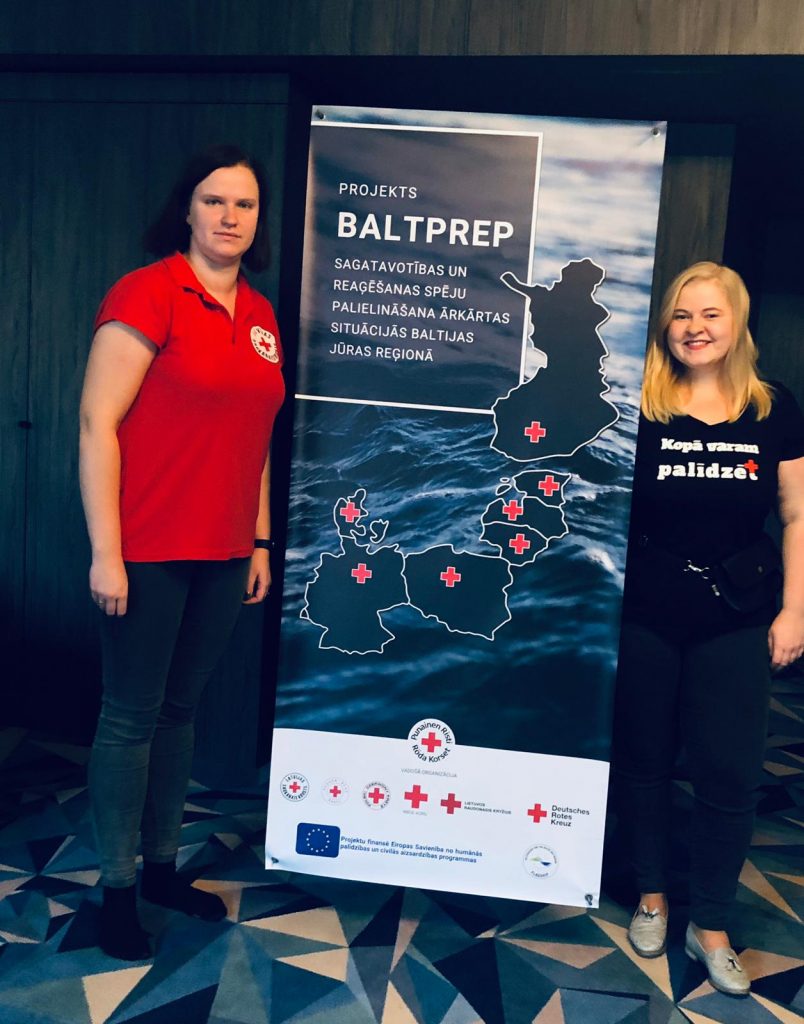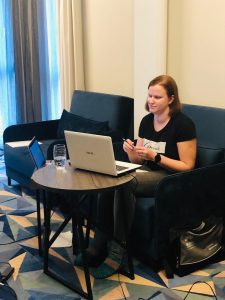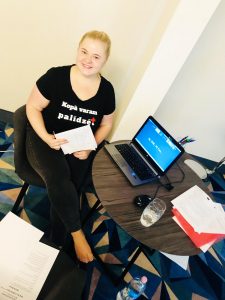
 On 27 – 30 October, 2020, within the international project “BALTPREP – enhancing regional preparedness and response capacity for major accidents in the Baltic Sea region” representatives of the Latvian Red Cross joined the Psychosocial support (PSS) specialist training 2020. It was organised by the Danish Red Cross.
On 27 – 30 October, 2020, within the international project “BALTPREP – enhancing regional preparedness and response capacity for major accidents in the Baltic Sea region” representatives of the Latvian Red Cross joined the Psychosocial support (PSS) specialist training 2020. It was organised by the Danish Red Cross.
During four days of training participants from Latvian, Danish, Lithuanian, Estonian, Finnish, Polish and Russian Red Cross national societies studied such topics as auxiliary mandate and role of national societies in the context of disasters, fundamental principles of provision PSS and psychological first aid (PFA) to the citizens in emergency and crisis situations. Participants also learned about Red Cross Tracing Service and its program Restoring Family Links, practical approaches of providing assistance, protection of children, short-term and long-term effects of emergencies on the territory of the country and the region as a whole.
The main focus was to analyse different disaster scenarios by dividing into smaller groups of participants, where everyone had the chance to do role plays and to look for practical approaches of providing help and organising psychosocial support interventions depending on different groups of society – adults, seniors, children, migrants etc.
During the training, the participants learned how to ask relevant questions, arrange them correctly and ask people according to different target groups – not only host community, but also immigrants from other countries, including refugees and asylum seekers. Different ethical aspects were discussed too. Various approaches on how to prepare Red Cross volunteers were discussed, especially those volunteers who would provide psychological and psychosocial assistance to those most in need in emergencies, not only in the volunteer’s home country but also in emergencies in other countries.
This training was special with its practical approach, because every task had to be done by groups by making presentations, drawings, exchanging experiences and sharing opinions.
Reflections of participants:
Evita Semule
“I have to say, that these four days in PSS training definitely were one of the most interesting experience I have ever had. Sometimes when hearing a phrase “online training” people think about boring and tiring video lectures, but it was surprising how well organised, engaging and dynamic PSS training was. It was organised mostly focusing on individual and group work, discussions and practical approaches of learning including role plays with change of appearance and different situation scenarios.
The training was valuable: it gave very important experience and knowledge on how to provide PSS during disaster. Although LatRC experience in providing PSS in disasters in other countries is not that great, topics and advises studied during the training were very actual and have been used during our everyday work, for example in the response of COVID-19 pandemics, provision of First Aid in public events, work with people in need and with children and youngsters. Depending on that, I tried to think about, how we can adapt lessons learnt during the training in our everyday work in future here in Latvia.
One example. Playing a role-play and imagining myself as an old, deaf man (who has suffered the explosion and has taken to a camp set up at school), I immediately visualized the music festivals in Latvia. The main questions for me was, what would we do if we were there and provided first aid, what kind of help we would be ready to provide immediately and how we would be able to include the volunteers and staff members from the nearest LatRC regional branches. The training was certainly very valuable and provided new knowledge and understanding of the provision of psychological support.”
Solvita Bespalova
“This was the first time I joined an international online training about a topic that I am not experience in. Thanks to the professionality and support of organizers, the training was so interesting, valuable, intense and dynamic. At the end of the training, I came to a conclusion that the development of LatRC activities and projects in such topics as PSS and mental health are very crucial. The great RC cooperation network all over the world could be a great support in making new projects, activities, volunteer trainings by attracting PSS and other specialists from other RC national societies, for example, from Denmark, Germany, Finland etc. Thanks for the opportunity to participate in the “BALTPREP” project and this training.”



